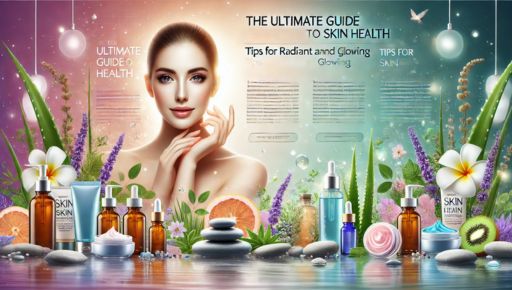Skin health is one of the most important aspects of overall well-being. Our skin is not only the largest organ in the body, but it also serves as a protective barrier against environmental toxins, harmful UV rays, and infections. Maintaining healthy skin requires a combination of proper skincare, nutrition, hydration, and lifestyle habits. In this comprehensive guide, we’ll dive into everything you need to know about skin health, from the best practices for a radiant complexion to the most common skin concerns and how to tackle them.
Why Skin Health Matters
Our skin plays an essential role in protecting our internal organs from damage. It acts as a shield against pollutants, bacteria, and extreme weather conditions. Healthy skin also helps regulate body temperature, produce vitamin D from sunlight, and is a reflection of our overall health.
When our skin is not well taken care of, it can become dry, irritated, and more susceptible to conditions like acne, eczema, and premature aging. This is why taking steps to prioritize skin health is crucial not only for cosmetic reasons but also for our general well-being.
Essential Tips for Maintaining Healthy Skin
Achieving and maintaining healthy skin involves a variety of factors. Here are some of the most important tips for promoting skin health:
1. Stay Hydrated
One of the simplest yet most effective ways to support skin health is by staying hydrated. Water is essential for every cell in the body, including those in your skin. When your body is dehydrated, your skin can become dry, flaky, and more prone to wrinkles.
Drinking enough water helps maintain your skin’s elasticity, promotes blood circulation, and supports detoxification. Aim to drink at least 8 glasses of water per day, and more if you are physically active or live in a hot climate.
2. Follow a Skincare Routine
A regular skincare routine is one of the best ways to keep your skin healthy. Whether you have oily, dry, combination, or sensitive skin, it’s important to find the right products and techniques that work for your unique needs. A basic skincare routine generally includes:
- Cleansing: Start by cleansing your skin to remove dirt, makeup, and excess oils. Look for a gentle cleanser that suits your skin type and avoid harsh products that can strip the skin of its natural oils.
- Exfoliation: Exfoliating once or twice a week removes dead skin cells and promotes cell turnover, revealing fresher, smoother skin. Be careful not to over-exfoliate, as this can cause irritation.
- Moisturizing: Moisturizing helps maintain the skin’s hydration levels. Choose a moisturizer that suits your skin type. For dry skin, opt for thicker creams, while lighter gels or lotions are ideal for oily skin.
- Sun Protection: Sunscreen is crucial in protecting your skin from harmful UV rays that can lead to premature aging, sunburns, and skin cancer. Use a broad-spectrum sunscreen with an SPF of at least 30, and apply it every day, even on cloudy days.
3. Eat a Skin-Healthy Diet
What you put into your body can have a direct impact on your skin’s appearance and health. A balanced diet rich in vitamins, minerals, and antioxidants can help combat inflammation, protect against oxidative damage, and improve the skin’s texture.
- Vitamin C: Found in citrus fruits, strawberries, and bell peppers, vitamin C is a powerful antioxidant that helps promote collagen production, which keeps the skin firm and youthful.
- Omega-3 Fatty Acids: Omega-3s found in fatty fish like salmon, walnuts, and flaxseeds help maintain the skin’s lipid barrier, preventing dryness and inflammation.
- Vitamin A: This vitamin, found in foods like carrots, sweet potatoes, and leafy greens, is vital for healthy skin cell turnover and can help reduce the appearance of wrinkles and fine lines.
- Zinc: Zinc supports the healing of wounds and helps manage oil production. You can find zinc in foods like nuts, seeds, and legumes.
4. Get Enough Sleep
Sleep is crucial for overall health, including skin health. During sleep, the body goes into repair mode, regenerating cells, repairing damaged tissues, and boosting circulation. A lack of sleep can lead to dull, tired-looking skin and exacerbate skin conditions such as acne or eczema.
Aim for 7-9 hours of quality sleep each night. To support restful sleep, establish a consistent bedtime routine, avoid caffeine and screens before bed, and keep your bedroom cool and dark.
5. Manage Stress
Stress has a direct impact on your skin’s appearance. High stress levels can increase the production of cortisol, a hormone that can lead to acne, skin irritation, and other skin problems. Additionally, stress can disrupt your sleep patterns and eating habits, which can further affect your skin health.
Incorporating stress-reducing activities such as yoga, meditation, deep breathing exercises, or even regular physical activity can help reduce stress and promote better skin.
Common Skin Concerns and Solutions
While following a healthy skincare routine can go a long way in maintaining healthy skin, many people still experience specific skin concerns. Here are some common skin issues and how to address them:
1. Acne
Acne is one of the most common skin conditions, affecting people of all ages. It is often caused by hormonal imbalances, excess oil production, and clogged pores. To manage acne, try the following:
- Use non-comedogenic products: These products are formulated to prevent clogged pores and acne breakouts.
- Don’t pick at your skin: Picking at acne lesions can worsen inflammation and lead to scarring.
- Consult a dermatologist: If over-the-counter treatments aren’t effective, a dermatologist can recommend stronger prescription treatments such as topical retinoids or oral medications.
2. Eczema
Eczema, or atopic dermatitis, is a condition that causes dry, itchy, and inflamed skin. To soothe eczema:
- Use gentle, fragrance-free skincare products that are designed for sensitive skin.
- Moisturize regularly to lock in hydration and prevent flare-ups.
- Avoid known triggers: Certain foods, allergens, or harsh weather conditions can trigger eczema, so try to avoid these whenever possible.
3. Hyperpigmentation
Hyperpigmentation occurs when certain areas of the skin become darker than the surrounding skin, often due to sun exposure, acne scars, or hormonal changes. To treat hyperpigmentation:
- Apply sunscreen daily to prevent further darkening of spots.
- Use products containing ingredients like Vitamin C, niacinamide, or retinoids, which can help brighten the skin and reduce pigmentation over time.
- Be patient: Hyperpigmentation can take time to improve, so consistency is key.
Conclusion: Achieving Radiant Skin Starts with Skin Health
Maintaining skin health is essential for a youthful appearance, protection against external factors, and overall well-being. By staying hydrated, following a proper skincare routine, eating a balanced diet, managing stress, and getting enough sleep, you can enjoy healthy, radiant skin for years to come. Whether you’re dealing with acne, eczema, or simply want to maintain a glowing complexion, taking proactive steps to care for your skin is key. Start implementing these tips today and experience the positive effects on your skin health.




